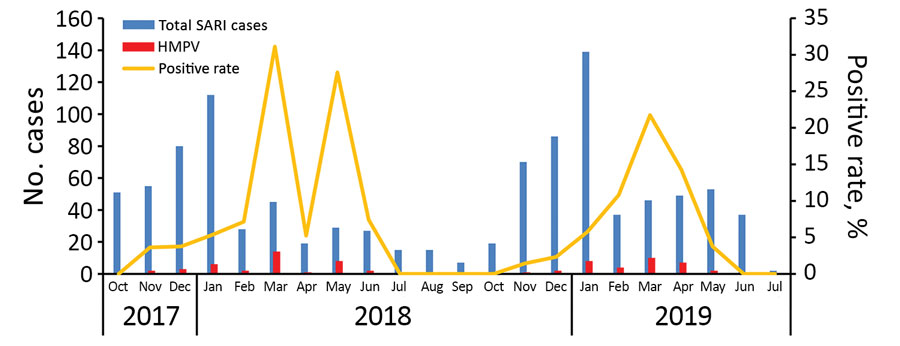


The recent outbreak of Human Metapneumovirus (HMPV) in China has caused concern among international agencies, leading to heightened surveillance and close monitoring of respiratory infections by the National Centre for Disease Control (NCDC). As the number of cases continue to rise, experts stress the need for early detection and prevention measures to control the spread of the virus. According to Dr Arjun Dang, CEO of Dr Dangs Lab, PCR testing is the most effective way to diagnose HMPV, and simple precautions like hand-washing and avoiding contact with sick individuals can help reduce its spread.
Human Metapneumovirus (HMPV): A Respiratory Concern
Human Metapneumovirus (HMPV) is a common respiratory virus that affects people of all ages but is particularly severe in infants and young children. It is spread through contact with respiratory droplets from an infected person, such as through coughing or sneezing.
Current Outbreak in China
Recently, China has experienced an outbreak of HMPV, prompting international concern. The virus has caused an increase in respiratory infections, and health authorities are closely monitoring the situation. The National Centre for Disease Control (NCDC) has heightened surveillance and implemented measures to control the spread of the virus.
Diagnosis and Prevention
PCR testing is the most effective method to diagnose HMPV. Early detection is crucial for isolating infected individuals and preventing further transmission. Standard precautions, such as hand-washing and avoiding contact with sick individuals, can also help reduce the spread of the virus.
Historical Context
HMPV was first discovered in 2001 and has since become a common cause of respiratory infections worldwide. In the past, several outbreaks have occurred, including one in the United States in 2017 that led to numerous hospitalizations and deaths.
Top 5 FAQs
1. What are the symptoms of HMPV? Symptoms include fever, runny nose, cough, and difficulty breathing.
2. How is HMPV treated? There is no specific treatment for HMPV, but supportive care, such as rest and fluids, can help alleviate symptoms.
3. Is HMPV preventable? While there is no vaccine available for HMPV, simple precautions like hand-washing and avoiding contact with sick individuals can help prevent its spread.
4. Is HMPV a serious virus? HMPV can be particularly severe in infants and young children, but most people recover without complications.
5. What measures are being taken to control the outbreak in China? Health authorities are conducting enhanced surveillance, implementing isolation measures, and promoting public health awareness to prevent further transmission.

As India commemorates its Independence Day in 2025, it's important to share the spirit and pride of this special day with the world. From inspiring morning messages to beautiful patriotic images, this collection offers the perfect words and visuals to show your love for India. Whether it's through WhatsApp, Instagram, or other social media platforms, spread the joy and gratitude for your country on this momentous day.

As jihadists in Mali successfully choke off fuel supplies to the capital, Bamako, tensions rise as the junta struggles to maintain their power. This also sheds light on Russia's promise to provide security support in the region, bringing into question the effectiveness of their aid in combating terrorism. With dwindling resources and increasing instability, the situation in Mali remains uncertain.

The Al Falah University in Dhouj, Haryana is under the spotlight as the Enforcement Directorate launches an investigation into possible terror funding and financial irregularities related to the November 10 Delhi blast. A show-cause notice has been issued to the university which was the hub of the terror module and is unaccredited. Further details reveal how central and state agencies are also reviewing potential money exchanges and individuals associated with the attack. Additionally, the university's website has been taken down for further scrutiny.

Visual ethnographic researcher Amardeep Singh delivers a presentation at the 9th Military Literature Festival, shedding light on the political, social, and military aspects of Maharaja Ranjit Singh's reign. He emphasizes the plural and secular nature of the Lahore Darbar, which included Sikhs, Muslims, Hindus, Dogras, and Europeans in its military and civil institutions. Singh also details the campaigns led by General Hari Singh Nalwa and General Zorawar Singh, highlighting their successes in fortifying Punjab's north-western frontier and expanding control to Ladakh, Baltistan, and western Tibet. This presentation challenges the narrow religious definition often associated with Ranjit Singh's rule.

During his state visit to Bhutan, PM Modi met with both Bhutan's present and former kings, reaffirming India's commitment to its neighbor's development journey. Discussions covered key areas such as energy, capacity-building, connectivity, and defence, while joint activities and agreements highlighted the strong cultural and spiritual bonds between the two countries. This visit further strengthened the unique and longstanding partnership between India and Bhutan, setting the stage for future collaboration and mutual prosperity.

A woman from Telangana, India received closure after 15 years of uncertainty when Bahrain officials informed her that her husband had passed away five years ago due to ill health. Due to certain procedures and formalities, his body cannot be repatriated to India, but Bahrain has offered to conduct the final rites according to traditional customs. This news comes as the latest development in the rising number of deaths of Indian workers in Gulf countries, with the Telangana government providing financial aid to the families of the deceased. Stay updated with the latest developments by following us on Instagram.

World leaders from Estonia, Israel, Japan, Sri Lanka, Spain, Maldives, Ireland, and Italy have extended their support and condolences to India after a blast near Delhi's Red Fort Metro Station left 12 people dead and 20 others injured. Investigators suspect that the blast may have been triggered by the mishandling of explosives by suspects, leading to a high alert in the national capital. The UK has also updated its travel advisory for British nationals in Delhi to follow the guidance of local authorities.

In the wake of a deadly suicide bombing that killed 12 people in Islamabad, Pakistan Prime Minister Shehbaz Sharif has accused India of being behind the attack. He also linked the bombing to another assault on a cadet college near the Afghan border. However, the Pakistani Taliban (TTP) has claimed responsibility for the bombing, stating it was a retaliation against Pakistan's "un-Islamic laws". Interior Minister Mohsin Naqvi has confirmed the death toll while urging for restraint in comments made on social media in response to the attack.

The Pakistani Taliban has taken responsibility for a deadly attack on a district court in Islamabad, in which 12 people were killed and 27 others injured. The attack, which occurred as international events were taking place in the capital, targeted officials and individuals who enforce laws deemed as un-Islamic by the militant group. Pakistani officials have promised to identify the attacker and the Taliban has threatened to carry out more attacks until Islamic Sharia law is implemented in the country. This attack serves as a wake-up call for Pakistan's negotiations with neighboring Afghanistan and has been deemed as a state of war by the country's Defence Minister.

In a move to modernize and honor Oman's national observances, Sultan Haitham bin Tarik has declared two-day holidays for the country's 55th National Day. The announcement, issued through Royal orders, will apply to both public and private sector employees and aligns with the broader National Day celebrations. The decision comes after a redefinition of the National Day holiday earlier this year, following a new royal decree.